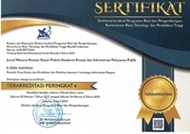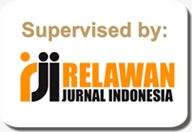Menuju Manajemen Talenta Sektor Publik: Faktor yang Memengaruhi, Tantangan, dan Strategi
Abstract
Focus of this research was to describe of talent management in public sector, especially influencing factors, challenges, and strategies. This research applied descriptive qualitative analysis by combining library research and examining secondary data. There were four factors that played as influence, challenge, and strategy in talent management implementation for public sector, i.e. (1) cultural, (2) human resource, (3) managerial/structural, and 4) environmental. Cultural factor included making sustainable talent management. Human resource included capability, passion, and program performance measurement. Managerial factor included leadership, organizational commitment, and activists were needed in implementing TM consistently. Environmental factor included regulation, budget, and political support on the national scale.
Keywords
Full Text:
PDFReferences
Acheampong, N. A. A. (2021). Reward Preferences of The Youngest Generation: Attracting, Recruiting, and Retaining Generation Z into Public Sector Organizations. Compensation & Benefits Review, 53(2), 75–97. https://doi.org/10.1177/0886368720954803.
Alziari, L. (2017). A Chief HR Officer’s Perspective on Talent Management. Journal of Organizational Effectiveness, 4(4), 379–383. https://doi.org/10.1108/JOEPP-05-2017-0047.
Ananthan, S. S., Manaf, H. A., Hidayati, M., & Dewi, D. S. K. (2019). The Development of Talent Management in Malaysian Public Sector: A Comprehensive Review. Problems and Perspectives in Management, 17(2), 242–253. https://doi.org/10.21511/ppm.17(2).2019.18.
Armstrong, M. (2006). A Handbook of Human Resource Management Practices. Kogan Page.
Ashton, C., & Morton, L. (2005). Managing Talent for Competitive. Performance Improvement Solutions, 4(5), 28–31.
Bastian, I. (2016). Strategi Manajemen Sektor Publik. Salemba Empat.
Bui, L. T. T., & Chang, Y. (2018). Talent Management and Turnover Intention: Focus on Danang City Government in Vietnam. International Review of Public Administration, 23 (4), 219–236. https://doi.org/10.1080/12294659.2018.1552403.
Clarke, M., & Scurry, T. (2020). The Role of The Psychological Contract in Shaping Graduate Experiences: A Study of Public Sector Talent Management Programmes in The UK and Australia. International Journal of Human Resource Management, 31(8), 965–991. https://doi.org/10.1080/09585192.2017.1396545.
Claus, L. (2019). HR Disruption—Time already to Reinvent Talent Management. BRQ Business Research Quarterly, 22(3), 207–215. https://doi.org/10.1016/j.brq.2019.04.002.
Collings, D. G., & Mellahi, K. (2009). Strategic Talent Management: A Review and Research Agenda. Human Resource Management Review, 19(4), 304–313. https://doi.org/10.1016/j.hrmr.2009.04.001.
Cooke, F. L., Saini, D. S., & Wang, J. (2014). Talent Management in China and India: A Comparison of Management Perceptions and Human Resource Practices. Journal of World Business, 49(2), 225–235. https://doi.org/10.1016/j.jwb.2013.11.006.
Cresswell, J. W. (2017). Research Design: Pendekatan Kualitatif, Kuantitatif, dan Mixed. (Terj). Achmad Fawaid. (4th ed.). Pustaka Pelajar.
Cross Walker, T. (2020). Inclusive Talent Management in The Public Sector: Theory and Practice. Transnational Corporations Review, 12(2), 140–148. https://doi.org/10.1080/19186444.2020.1741296.
d’Armagnac, S., Al Ariss, A., & N’Cho, J. (2021). Talent Management in Turbulent Times: Selection, Negotiation, and Exploration Strategies for Talent Management in The Aeronautics and Space Industries. International Journal of Human Resource Management, 0(0), 1–29. https://doi.org/10.1080/09585192.2021.1879205.
David, F. F., & David, F. R. (2016). Manajemen Strategik: Suatu Pendekatan Keunggulan Bersaing-Konsep (15th ed.). Salemba Empat.
Delfgaauw, J., & Dur, R. (2010). Managerial Talent, Motivation, and Self-Selection into Public Management. Journal of Public Economics, 94(9–10), 654–660. https://doi.org/10.1016/j.jpubeco.2010.06.007.
Descu, A. V. L. Ă. (2012). The Possibility of Implementing Talent Management in The Public. Management & Marketing, 7(2), 351–362.
Devine, M., & Powell, M. (2008). Talent Management in The Public Sector. The Ashridge Journal.
Di Paolo, A., & Mañé, F. (2016). Misusing Our Talent? Overeducation, Overskilling and Skill Underutilisation among Spanish PhD Graduates. Economic and Labour Relations Review, 27(4), 432–452. https://doi.org/10.1177/1035304616657479.
Dimitrov, K. (2015). Talent Management - an etymological study. Vanguard scientific instruments in management (VSIM), 11(2), 1-39.
Dries, N. (2013). The psychology of talent management: A Review and Research Agenda. Human Resource Management Review, 23(4), 272–285. https://doi.org/10.1016/j.hrmr.2013.05.001.
Ford, D. G. (2017). Talent Management and Its Relationship to Successful Veteran Transition Into the Civilian Workplace: Practical Integration Strategies for the HRD Professional. Advances in Developing Human Resources, 19(1), 36–53. https://doi.org/10.1177/1523422316682736.
Gallardo-Gallardo, E. (2019). Some Critical Reflections on The Relevance of Talent Management Research. Managing Talent: A Critical Appreciation, 33–50. https://doi.org/10.1108/978-1-83909-093-620201005.
Gallardo-Gallardo, E., Arroyo Moliner, L., & Gallo, P. (2017). Mapping Collaboration Networks in Talent Management Research. Journal of Organizational Effectiveness, 4(4), 332–358. https://doi.org/10.1108/JOEPP-03-2017-0026.
Gallardo-Gallardo, E., Thunnissen, M., & Scullion, H. (2020). Talent Management: Context Matters. International Journal of Human Resource Management, 31(4), 457–473. https://doi.org/10.1080/09585192.2019.1642645
Gelens, J., Dries, N., Hofmans, J., & Pepermans, R. (2013). The Role of Perceived Organizational Justice in Shaping The Outcomes of Talent Management: A Research Agenda. Human Resource Management Review, 23(4), 341–353. https://doi.org/10.1016/j.hrmr.2013.05.005.
Hamzah, A. (2019). Metode Penelitian Kepustakaan: Kajian Filosofis, Teoritis, dan Aplikatif. Literasi Nusantara Abadi.
Hoare, S., & Leigh, A. (2011). Talent Management: Financial Times Briefing. Pearson Education.
Hughes, J. C., & Rog, E. (2008). Talent Management: A Strategy for Improving Employee Recruitment, Retention and Engagement within Hospitality Organizations. International Journal of Contemporary Hospitality Management, 20(7), 743–757. https://doi.org/10.1108/09596110810899086.
Jackson, S. E., & Schuler, R. (1990). Human Resource Planning Challenges for Industrial/ Organizational Psycologist. American Psycologist, 45(2), 223–239.
Jayaraman, S., Talib, P., & Khan, A. F. (2018). Integrated Talent Management Scale: Construction and Initial Validation. SAGE Open, 8(3). https://doi.org/10.1177/2158244018780965.
Kock, R., & Burke, M. (2008). Managing Talent in The South African Public Service. Public Personnel Management, 37(4), 457–470. https://doi.org/10.1177/009102600803700406.
Kozjek, T., & Franca, V. (2020). Talent Management in The Public Sector. Central European Public Administration Review, 18(2), 53–71. https://doi.org/10.17573/cepar.2020.2.03.
Kravariti, F., & Johnston, K. (2020). Talent Management: A Critical Literature Review and Research Agenda for Public Sector Human Resource Management. Public Management Review, 22(1), 75–95. https://doi.org/10.1080/14719037.2019.1638439.
Kwon, K., & Jang, S. (2022). There is No Good War for Talent: A Critical Review of The Literature on Talent Management. Employee Relations, 44(1), 94–120. https://doi.org/10.1108/ER-08-2020-0374.
Luna-Arocas, R., Danvila-Del Valle, I., & Lara, F. J. (2020). Talent Management and Organizational Commitment: The Partial Mediating Role of Pay Satisfaction. Employee Relations, 42(4), 863–881. https://doi.org/10.1108/ER-11-2019-0429.
Macfarlane, F., Duberley, J., Fewtrell, C., & Powell, M. (2012). Talent Management for NHS Managers: Human Resources or Resourceful Humans? Public Money and Management, 32(6), 445–452. https://doi.org/10.1080/09540962.2012.728786.
Mathew, A. (2015). Talent Management Practices in Select Organizations in India. Global Business Review, 16(1), 137–150. https://doi.org/10.1177/0972150914553527.
Mcdonnell, A. (2011). Still Fighting The "War for Talent"? Bridging The Science Versus Practice Gap Science and Practice of Psychology in Organizations: State of the Practice Reflections Linked References are Available on JSTOR for This Article: Still Fighting The "War for Talent". Journal of Business and Psychology, 26(2), 169–173.
Michaels, E., Handfield-Jones, H., & Axelrod, B. (2001). The War for Talent. Harvard Business School Press.
Mohammed, A. A., Baig, A. H., & Gururajan, R. (2019). The Effect of Talent Management Processes on Knowledge Creation. Journal of Industry-University Collaboration, 1(3), 132–152. https://doi.org/10.1108/jiuc-05-2019-0010.
Mohammed, A. A., Baig, A. H., & Gururajan, R. (2020a). An Examination of Talent Management Processes in Australian Higher Education. International Journal of Productivity and Performance Management, 69(6), 1271–1299. https://doi.org/10.1108/IJPPM-10-2018-0352.
Mohammed, A. A., Baig, A. H., & Gururajan, R. (2020b). Proposal of A Guide for Talent Evaluation and Management Based on A Qualitative and Three-Staged Approach: A Case of The Higher Education Sector. Journal of Applied Research in Higher Education, 12(5), 1045–1078. https://doi.org/10.1108/JARHE-10-2018-0220.
Mousa, M., & Ayoubi, R. M. (2019). Talent Management Practices: Perceptions of Academics in Egyptian Public Business Schools. Journal of Management Development, 38(10), 833–846. https://doi.org/10.1108/JMD-01-2019-0030.
Mujtaba, M., & Mubarik, M. S. (2022). Talent Management and Organizational Sustainability: Role of Sustainable Behavior. International Journal of Organizational Analysis, 30(2), 389–407. https://doi.org/10.1108/IJOA-06-2020-2253.
Naim, M. F., & Lenka, U. (2017). Talent Management: A Burgeoning Strategic Focus in Indian It Industry. Industrial and Commercial Training, 49(4), 183–188. https://doi.org/10.1108/ICT-12-2016-0084.
Narayanan, A., Rajithakumar, S., & Menon, M. (2019). Talent Management and Employee Retention: An Integrative Research Framework. Human Resource Development Review, 18(2), 228–247. https://doi.org/10.1177/1534484318812159.
Nurharyoko, G., Pramudita, A., & Bambang, R. (2020). Inovasi Birokrasi: Membuat Kerja Birokrat Lebih Bermakna. Kepustakaan Populer Gramedia.
Oladapo, V. (2014). The Impact of Talent Management on Retention. Journal of Business Studies Quartely, 5(3), 19–36.
Pan, S. K. (2008). How to Attract and Retain The Best in Government. International Review of Administrative Sciences, 74(4), 637–652. https://doi.org/10.1177/0020852308098472.
Pawson, R. (2006). Evidence-Based Policy: A Realist Perspective. Sage Publications Ltd.
Pella, D. A., & Inayati, A. (2011). Talent Management: Mengembangkan SDM untuk Mencapai Pertumbuhan dan Kinerja Prima. Gramedia Press.
Poocharoen, O. orn, & Lee, C. (2013). Talent Management in The Public Sector: A Comparative Study of Singapore, Malaysia, and Thailand. Public Management Review, 15(8), 1185–1207. https://doi.org/10.1080/14719037.2013.816525.
Pramudita, A., Nurharyoko, G., & Bambang, R. (2020). Menguatkan Daya Dukung: IPTEK 4.0 dan SDM. R. B. B. Gogor Oko Nurhayoko, Ayodha Pramudita (Ed.), Inovasi Birokrasi: Membuat Kerja Birokrat Lebih Bermakna (p. 219). Kepustakaan Populer Gramedia.
Rana, G., Goel, A. K., & Rastogi, R. (2013). Talent Management: A Paradigm Shift in Indian Public Sector. Strategic HR Review, 12(4), 197–202. https://doi.org/10.1108/shr-02-2013-0012.
Reilly, P. (2018). Building Customer Centricity in The Hospitality Sector: The Role of Talent Management. Worldwide Hospitality and Tourism Themes, 10(1), 42–56. https://doi.org/10.1108/WHATT-10-2017-0068.
Ribeiro, J. L., & Gomes, D. (2017). What is Talent Management? The Perception from International Human Resources Management Students. Https://doi.org/10.1007/978-3-319-53400-8_4.
Satori, D., & Komariah, A. (2011). Metodologi Penelitian Kualitatif (Ketiga). Alfabeta.
Scaringella, L. dan Malaeb, R.C. (2014). “Contributions of talent people to knowledge management”, dalam The Journal of Apllied Business Research. Vol. 30, No. 3. Hlm: 715-724
Schweyer, A. (2004). Talent Management System: Best Practices in Technology Solutions for Recruitment, Retenstion, and Workforce Planning. John Wlley and Sons Canada, Ltd.
Sehatpour, M. H., Abedin, B., & Kazemi, A. (2021). Talent Management in Government Organizations: Identification of Challenges and Ranking The Solutions to Address Them. International Journal of Productivity and Performance Management. Https://doi.org/10.1108/IJPPM-05-2020-0231.
Shulga, L. V., & Busser, J. A. (2019). Talent Management Meta Review: A Validity Network Schema Approach. International Journal of Contemporary Hospitality Management, 31(10), 3943–3969. https://doi.org/10.1108/IJCHM-10-2018-0876.
Singh, A., & Sharma, J. (2015). Strategies for Talent Management: A Study of Select Organizations in The UAE. International Journal of Organizational Analysis, 23(3), 337–347. https://doi.org/10.1108/IJOA-11-2014-0823.
Siswanto, J., Cahyono, E., Monang, J., Aisha, A. N., & Mulyadi, D. (2021). Identifying Talent: Public Organization with Skewed Performance Scores. Journal of Management Development, 40(4), 293–312. https://doi.org/10.1108/JMD-05-2020-0137.
Sparrow, P. R., & Makram, H. (2015). What is The Value of Talent Management? Building Value-Driven Processes within A Talent Management Architecture. Human Resource Management Review, 25(3), 249–263. https://doi.org/10.1016/j.hrmr.2015.04.002.
Stadler, K. (2011). Talent Reviews: The Key to Effective Succession Management. Business Strategy Series, 12(5), 264–271. https://doi.org/10.1108/17515631111166906.
Suk Kim, P., & Kotchegura, A. (2017). Talent Management in Government in Times of Economic Instability: Selected Cases from The Brics Countries. Public Money and Management, 37(1), 7–14. https://doi.org/10.1080/09540962.2016.1249223.
Tafti, M. M., Mahmoudsalehi, M., & Amiri, M. (2017). Critical Success Factors, Challenges and Obstacles in Talent Management. Industrial and Commercial Training, 49(1), 15–21. https://doi.org/10.1108/ICT-05-2016-0036.
Thunnissen, M. (2016). Talent Management: for What, How and How Well? An Empirical Exploration of Talent Management in Practice. Employee Relations, 38(1), 57–72. https://doi.org/10.1108/ER-08-2015-0159.
Thunnissen, M., Boselie, P., & Fruytier, B. (2013). A Review of Talent Management: “Infancy or Adolescence?” International Journal of Human Resource Management, 24(9), 1744–1761. https://doi.org/10.1080/09585192.2013.777543.
Thunnissen, M., & Buttiens, D. (2017). Talent Management in Public Sector Organizations: A Study on The Impact of Contextual Factors on The TM Approach in Flemish and Dutch Public Sector Organizations. Public Personnel Management, 46(4), 391–418. https://doi.org/10.1177/0091026017721570.
Ulrich, D., & Smallwood, N. (2012). What is Talent. Leader to Leader, 63, 55–61.
van Dijk, H. G. (2009). Administration vs Talent : The Administrative Context for Talent Management. Journal of Public Administration, 44(3), 520–530.
Wang, C. L., & Chugh, H. (2014). Enterpreneurial Learning: Past Research and Future Challenges. International Journal of Management Reviews, 16(1), 24–61.
DOI: http://dx.doi.org/10.31845/jwk.v25i2.742
Refbacks
- There are currently no refbacks.
Copyright (c) 2022 Ramadhani Haryo Seno

This work is licensed under a Creative Commons Attribution-NonCommercial-ShareAlike 4.0 International License.
JURNAL WACANA KINERJA INDEXED BY:
__________________________________________________________________________________________________________
@2023 Center fo State Civil Apparatus Training and Development and Competency Mapping (Pusat Pelatihan dan Pengembangan dan Pemetaan Kompetensi Aparatur Sipil Negara Lembaga Administrasi Negara - Puslatbang PKASN LAN) Jl. Kiara Payung KM. 4, 7 Jatinangor, Sumedang, Jawa Barat 45366 Telp. (022) 7790048-7790044-7790049-7782041-7782042 Fax. (022) 7790055-7782178; Email: wacanakinerja@yahoo.com; wacanakinerja@gmail.com
Powered by OJS
















